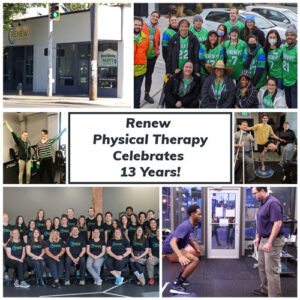
Ever wondered about the intricate link between your diet, hydration, and the well-being of your gut? This month, we sat down with a Renew physical therapist, Sara Nichols, PT, DPT, at our Columbia City location to learn more about the world of gut health and its impact on chronic pain, inflammation, and overall digestive function.
Q: How can a person’s diet affect chronic pain or inflammation, and how is this linked to gut/gastrointestinal issues?
A: The bacteria in your gut make up 90% of your genetics. When you don’t feed the good bacteria in your gastrointestinal (GI) tract, it can greatly impact your systemic health and wellness. Your gut is coined the “second brain” due to the enteric nervous system lining your entire GI tract, which contributes to immune function and hormonal regulation.
Q: How does hydration impact overall gut/GI health?
A: Hydration is especially important for the breakdown and absorption of nutrients, gut motility (transit time in bowels), and gut microbiome support. It will also impact your stool quality, which could lead to GI concerns such as constipation, hemorrhoids, or pelvic floor dysfunction.
Q: What are some common foods/food properties to look for that help with gut/GI health?
A: Probiotic foods would be a fantastic addition to your diet, specifically, fermented foods. This could include kimchi, fermented pickles (not just regular pickles), sauerkraut, kombucha, kefir, etc. You could add a probiotic supplement, but it is always best to get your nutrients from their natural source. I would also recommend slowly adding foods with fiber. Fiber (or “prebiotics”) are the food for the good bacteria. But as with any changes to diet, I would recommend adjusting slowly.
Q: Are there foods/food properties that can aggravate gut/GI issues, and should be avoided?
A: Sugar is essentially the food for the “bad” bacteria, so keep an eye out for any added sugars to your foods. When we consume natural sugars in fruit, for example, we still get tons of benefits from all the other nutrients. We want to be careful about processed foods and sugary products. I would also be mindful of alcohol consumption. Alcohol itself is not carcinogenic. However, breaking down alcohol leads to a toxic byproduct called acetaldehyde, which proliferates in the saliva, gastric fluids, and the large intestines.
Q: What are some hydration tips to maintain a healthy gut and overall digestive function?
A: The rule of “8 glasses of water per day” has become quite dated. I would recommend slowly increasing your water intake over the course of a couple of weeks (to prevent you spending all your time in the bathroom!). Instead, work towards consuming half your body weight in fluid ounces (i.e. 120-pound person should drink 60 Fl oz). This will increase/decrease based on activity levels and any other health concerns.
Q: How can physical therapy help with gut/GI issues?
A: Physical therapy can help in so many ways! We would continue to have conversations around lifestyle and stress that could be impacting GI health/wellness. It could include learning and applying manual techniques and exercises to improve your motility. Additionally, your therapist can further assess if your pelvic floor is coordinating appropriately when using the restroom.
For more personalized guidance on improving your gut health and addressing any specific concerns, consider scheduling a consultation with a Renew physical therapist, who can provide tailored advice and support based on your individual needs and goals. Book your appointment today.







